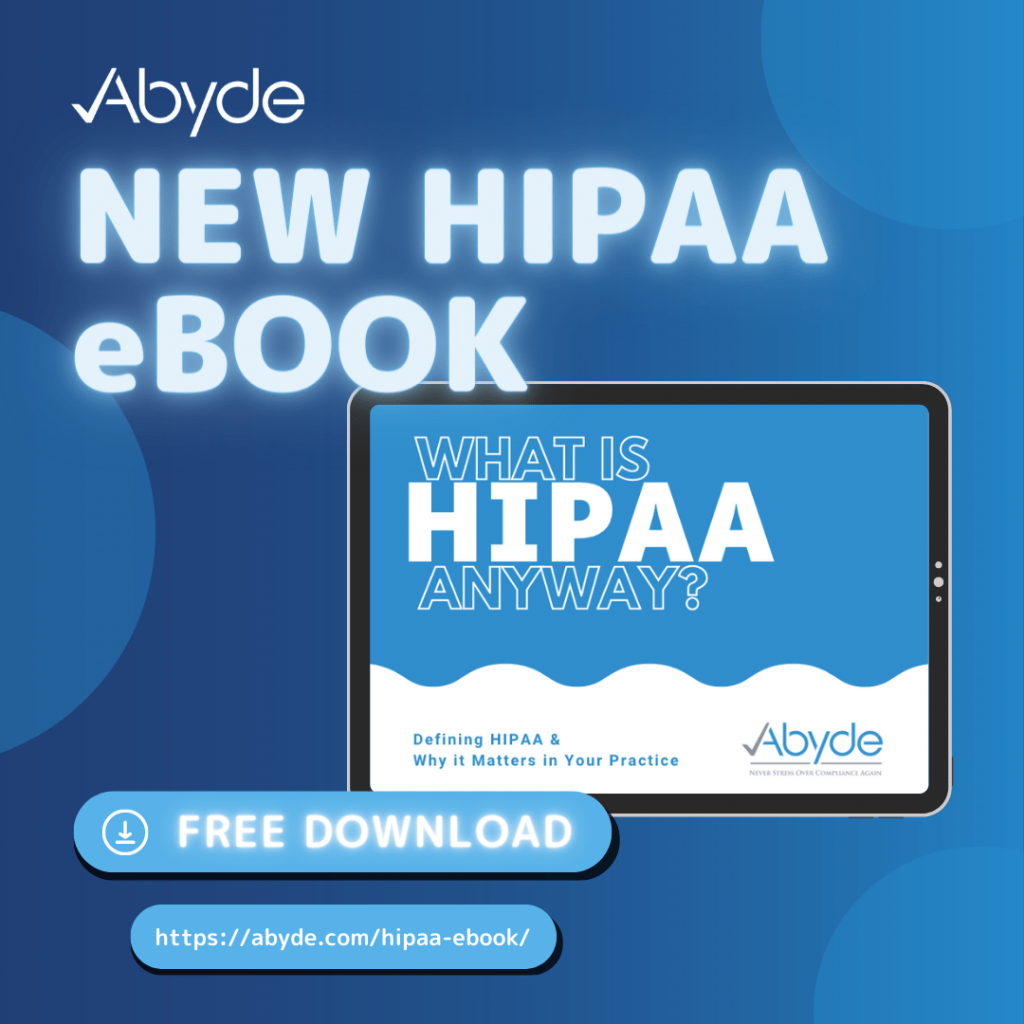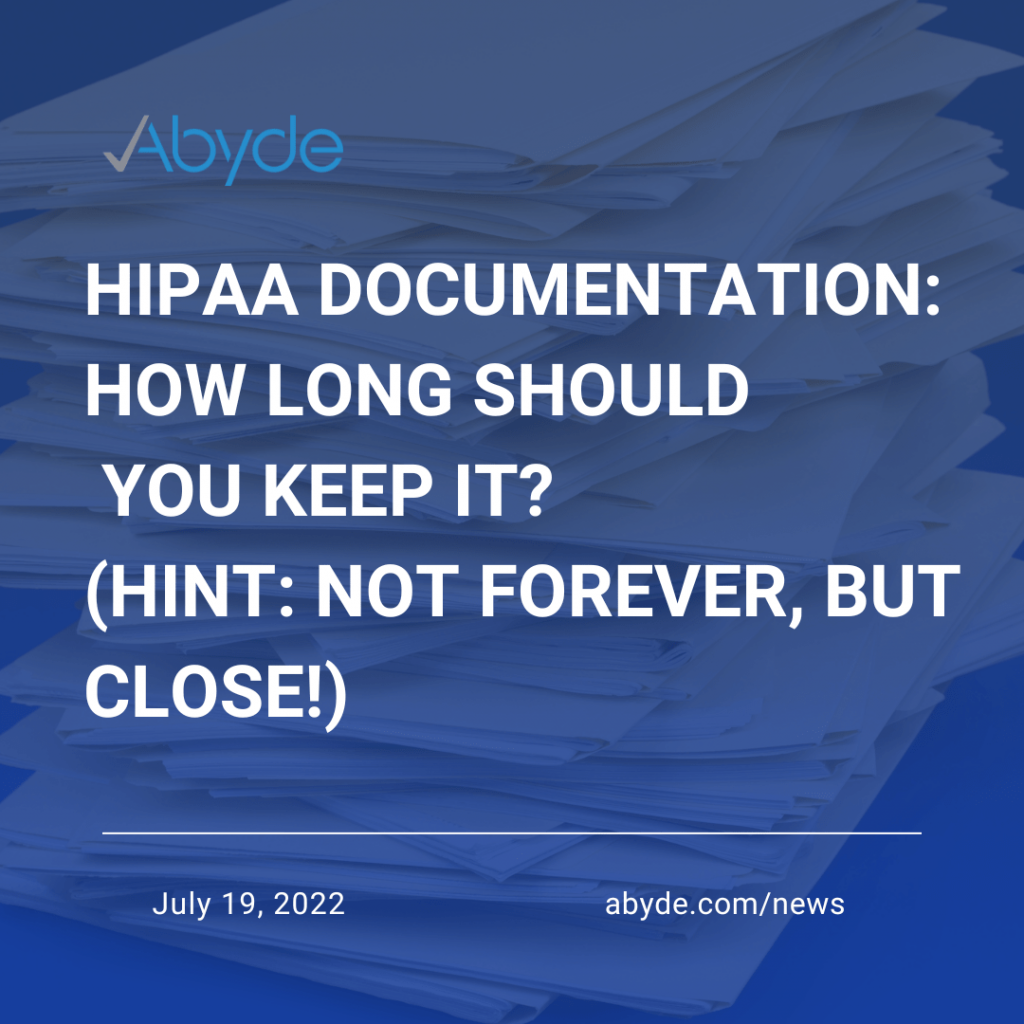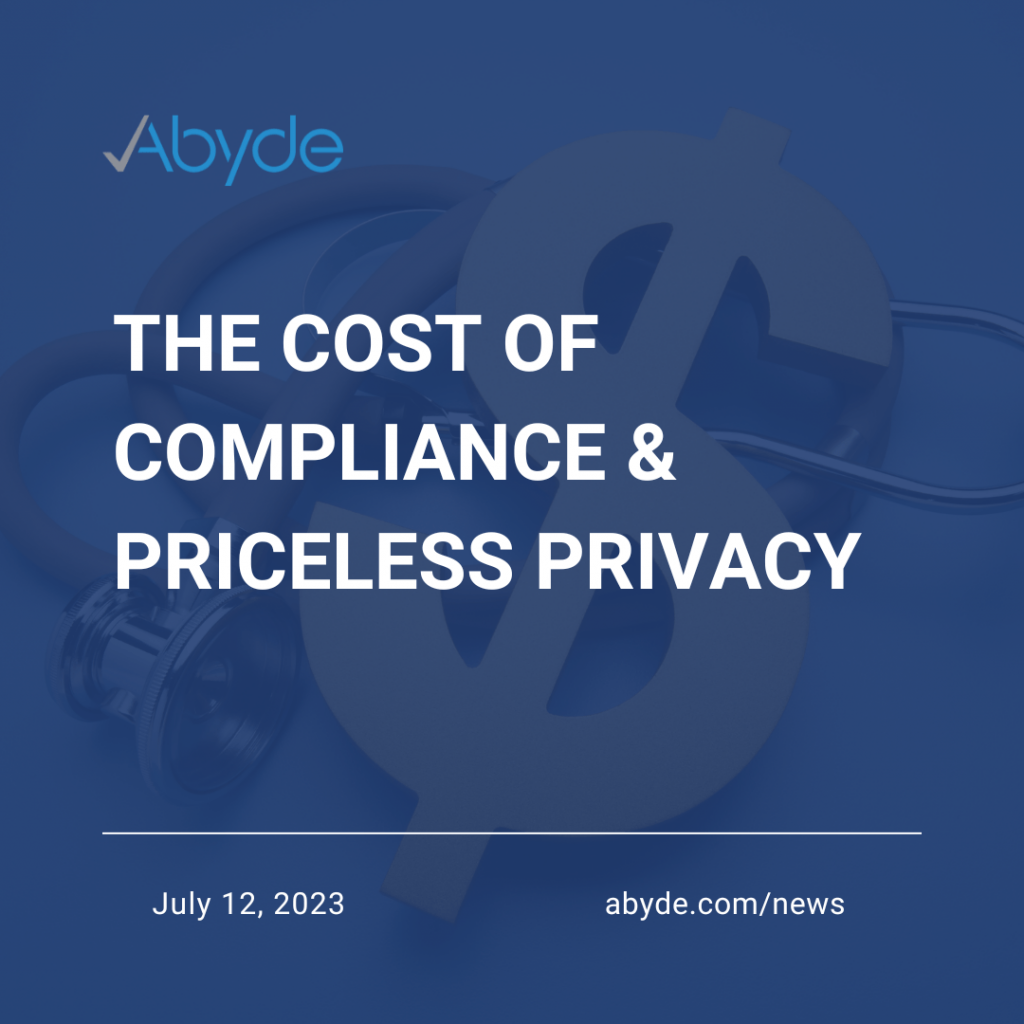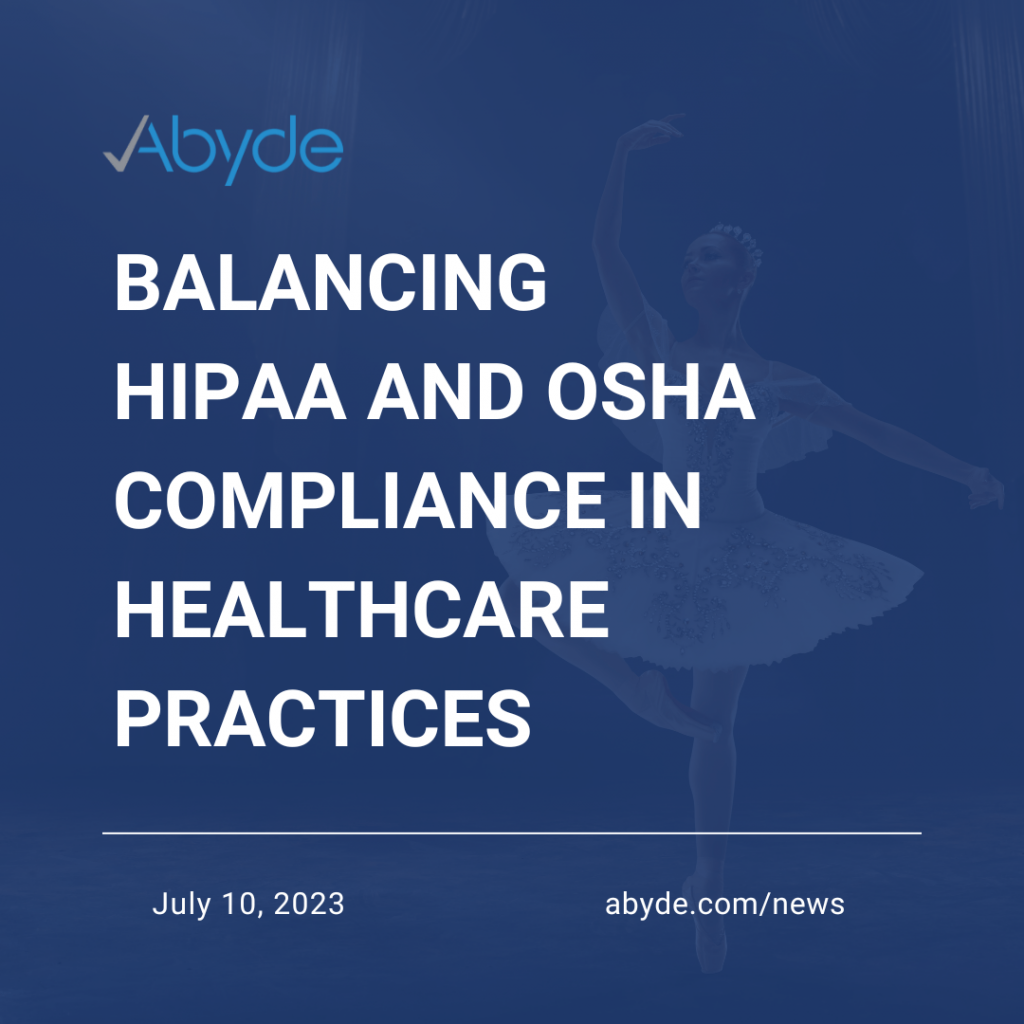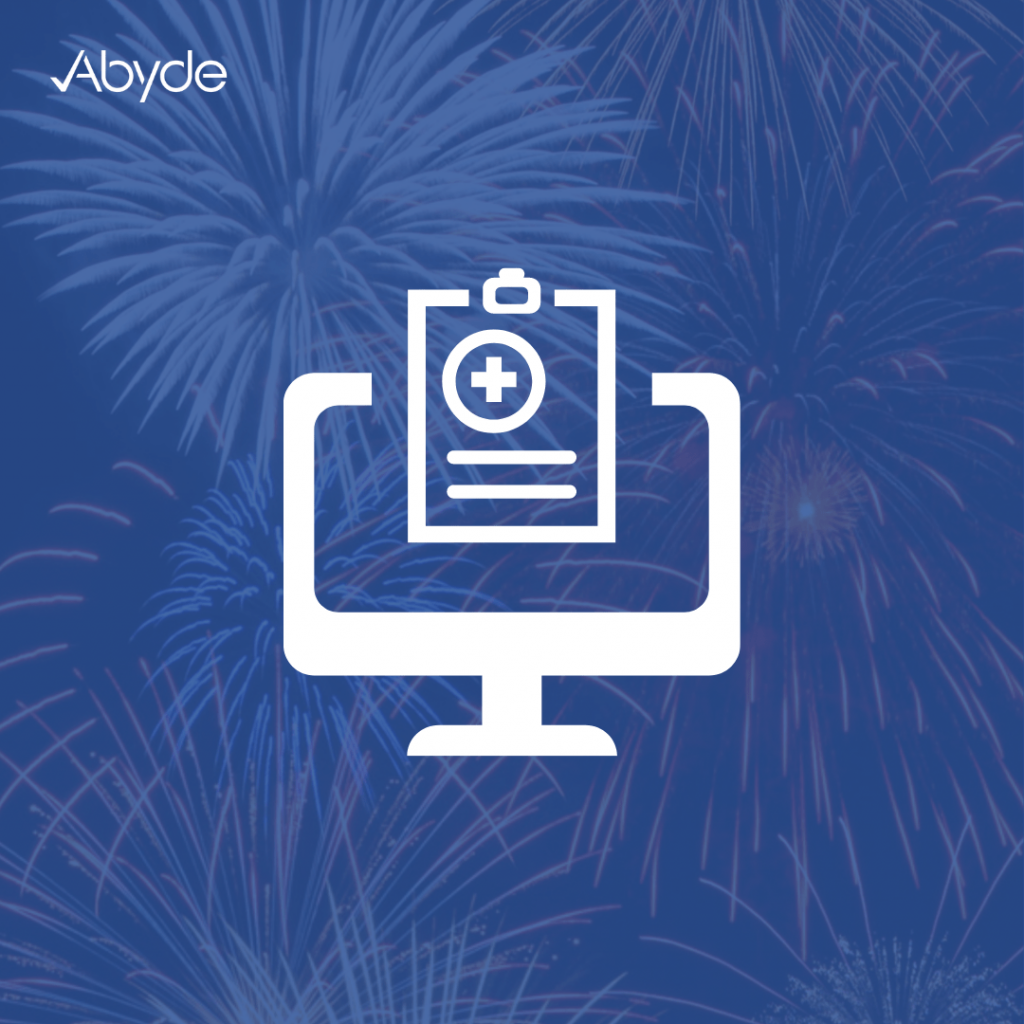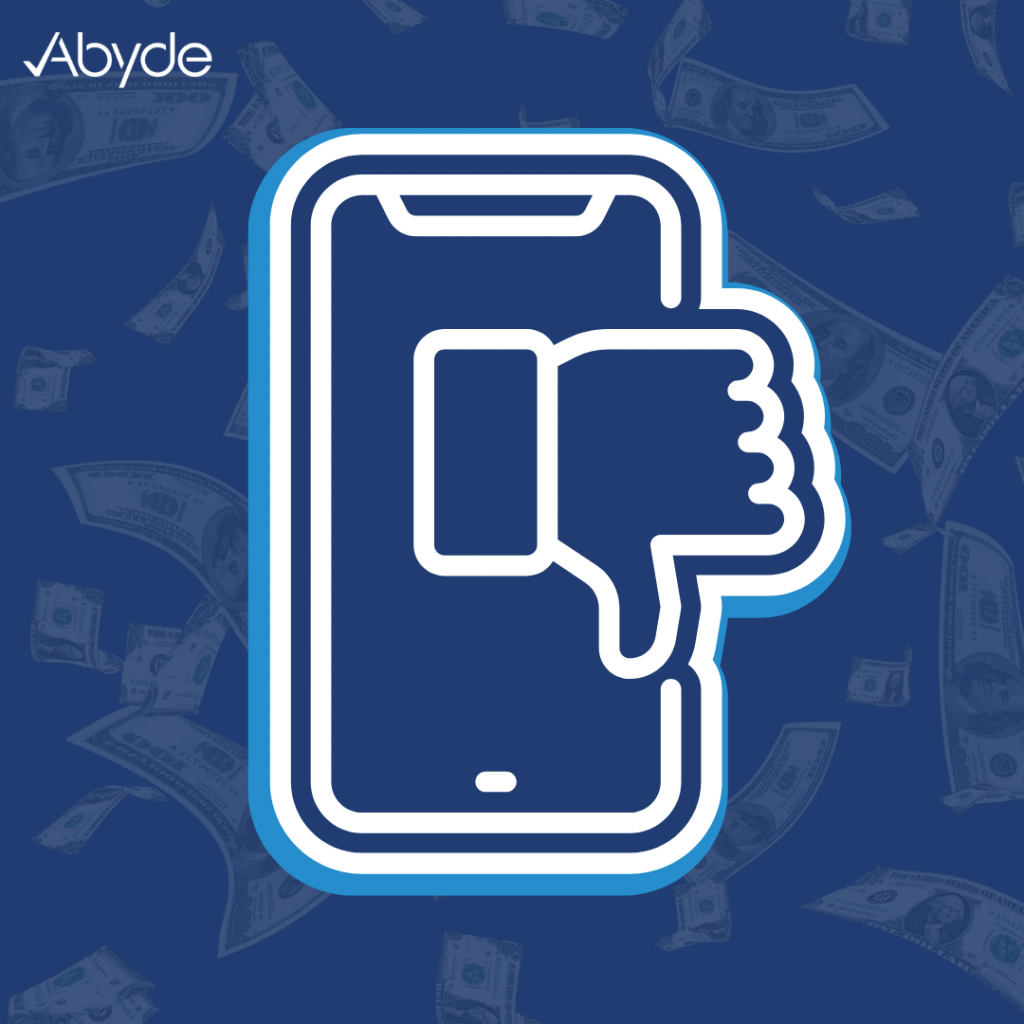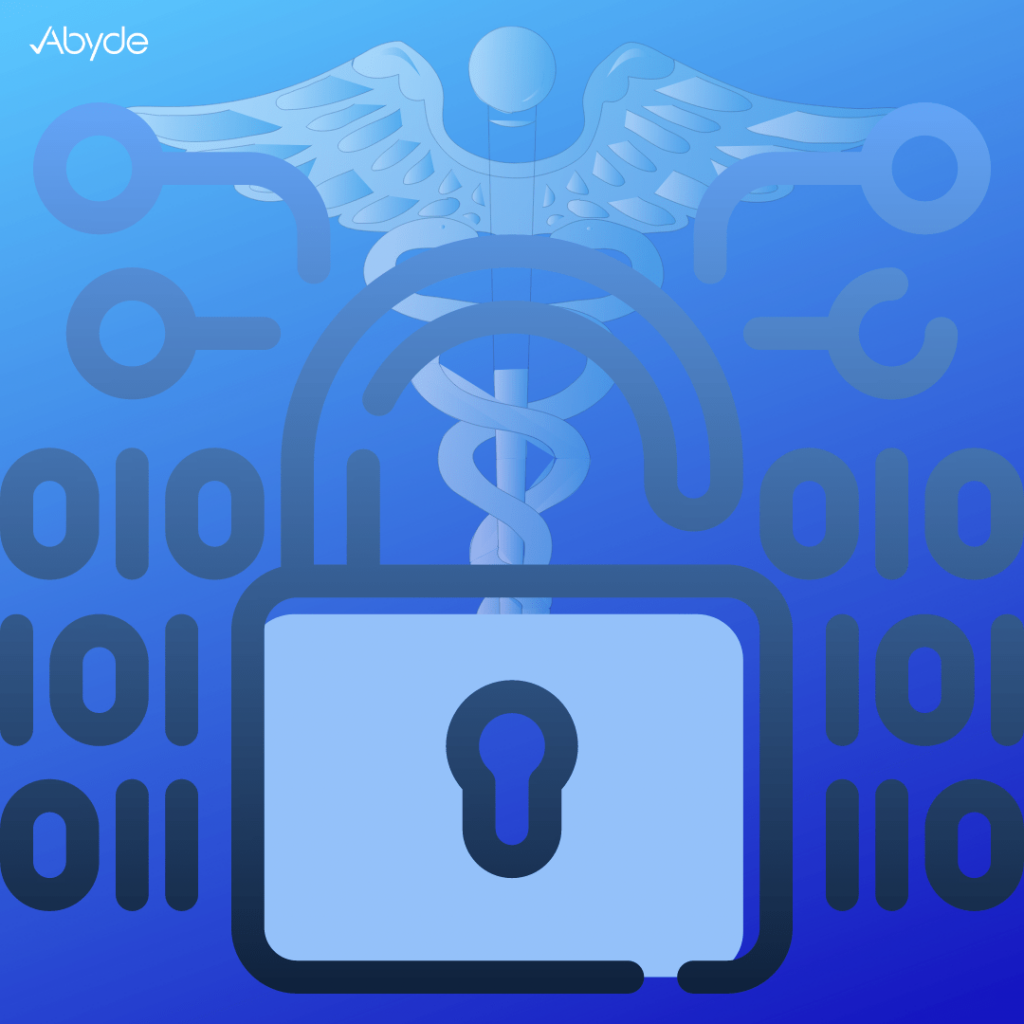August 1, 2023 Navigating the complexities of HIPAA compliance can be overwhelming, especially when you have numerous other pressing concerns in your field. As healthcare professionals, you might be familiar with HIPAA, but it’s understandable that it’s not always at the top of your priority list. However, ensuring compliance with HIPAA is crucial to safeguarding patient privacy, protecting sensitive data, and avoiding potential scrutiny from government audits. In response to the need for a practical and concise approach to HIPAA compliance, Abyde created our own one-of-a-kind HIPAA eBook. This convenient reference aims to provide your practice with a comprehensive yet easy-to-follow overview of HIPAA’s role in your field, empowering you to confidently address compliance challenges without being weighed down by complex regulatory jargon. This eBook starts by demystifying HIPAA, offering a clear overview of its relevance in your specific healthcare field. Whether you run a medical practice, dental clinic, or any other healthcare facility, this guide tailors the information to your unique needs, making it easier to understand the specific requirements that apply to your practice. We recognize your busy schedule, so the eBook streamlines the essential steps to achieve HIPAA compliance. It breaks down the Privacy Rule and Security Rule into manageable segments, providing practical insights and real-life examples relevant to your daily operations, and offers a simplified approach to conducting a risk assessment. It guides you through identifying potential weaknesses in your data handling processes, allowing you to proactively address security gaps and minimize the risk of data breaches. Electronic Protected Health Information (ePHI) is prevalent in modern healthcare practices, necessitating robust data security measures. Abyde’s eBook also emphasizes the importance of safeguarding ePHI and provides expert recommendations on encryption, secure data transmission, and strong password policies. While the intricacies of HIPAA compliance might not be your primary focus, ensuring your practice adheres to these regulations is paramount for patient trust, data security, and legal protection. Abyde’s free HIPAA eBook offers the perfect solution, providing a concise and comprehensive overview of HIPAA’s role in your field. Download your HIPAA eBook today!
SR-Hey, Have You Conducted a Security Risk Analysis?
July 28, 2023 In the ever-evolving landscape of healthcare, the safeguarding of sensitive patient information is of paramount importance. To protect patient privacy and maintain health data integrity, the Health Insurance Portability and Accountability Act (HIPAA) sets stringent standards for compliance. One of the vital components in achieving HIPAA compliance is conducting Security Risk Analyses (SRAs). Understanding HIPAA and its Compliance Requirements HIPAA, enacted in 1996, is a landmark piece of legislation designed to protect the privacy and security of patients’ health information. The regulation establishes a set of rules that healthcare providers, health plans, and other covered entities must follow to ensure the confidentiality and integrity of patients’ protected health information (PHI). Failure to comply with HIPAA can lead to severe consequences, including hefty fines and reputational damage. But we all knew that, right? What is a Security Risk Analysis (SRA)? Now this is what we need to know! A Security Risk Analysis systematically evaluates an organization’s information technology infrastructure, policies, and procedures to identify potential vulnerabilities and risks to the confidentiality, integrity, and availability of PHI. An SRA aims to assess the organization’s current security measures, identify weaknesses, and implement necessary safeguards to mitigate risks effectively. Why is an SRA Important for HIPAA Compliance? Identifying Vulnerabilities: An SRA helps healthcare organizations identify potential vulnerabilities in their systems and processes that could lead to unauthorized access or disclosure of PHI. By understanding these weaknesses, organizations can take proactive measures to address them before any security breach occurs. Preventing Data Breaches: Data breaches in healthcare can expose sensitive patient information, leading to significant legal and financial consequences. Conducting an SRA helps preemptively prevent data breaches by bolstering security measures and ensuring compliance with HIPAA’s Security Rule. Mitigating Risks: Risks in healthcare are constantly evolving due to new cybersecurity threats and technological advancements. Regular SRAs allow organizations to stay ahead of potential risks and adopt measures to mitigate them effectively. Tailoring Security Measures: Each healthcare organization has unique systems and processes. An SRA helps identify specific security needs and allows the organization to tailor security measures to address its individual risks effectively. Demonstrating Compliance: HIPAA compliance requires organizations to conduct regular SRAs. By documenting assessments, organizations can demonstrate their commitment to safeguarding patient data, which is essential during audits and investigations. Improving Security Posture: SRAs are not just a checkbox exercise; they provide valuable insights into the organization’s overall security posture. Based on the analysis results, organizations can continually implement improvements to enhance their security measures. Legal and Reputational Protection: A data breach can tarnish an organization’s reputation and erode patient trust. By conducting SRAs and implementing robust security measures, healthcare entities can enhance their legal and reputational protection. At Abyde, we take a distinctive approach to SRAs by offering a personalized and tailored experience for you and your practice. Think of our SRA module as your dedicated companion, guiding you through the process of identifying vulnerabilities specific to your practice. Recognizing that each practice is unique, our intuitive software will present only the questions relevant to your business as you respond. This streamlined approach is one of the many ways we ensure simplicity and effectiveness in achieving your compliance goals. The protection of patient data is not only a legal obligation but also an ethical responsibility for healthcare organizations. HIPAA compliance is critical in ensuring that patient information remains secure and confidential. Regular SRAs are an indispensable aspect of HIPAA compliance, allowing organizations to identify vulnerabilities, prevent data breaches, and mitigate risks effectively. By investing in security measures and staying proactive in their approach, healthcare organizations can reinforce patient trust and safeguard the integrity of their services in today’s increasingly digital healthcare landscape.
HIPAA Documentation: How Long Should You Keep It? (Hint: Not Forever, But Close!)
July 19, 2023 Step into the world of healthcare compliance, where regulations intertwine with sensitive data, and privacy is paramount. Today, we delve into the intricacies of HIPAA documentation, unraveling the enigma that shrouds its retention period. Understanding the Birth of HIPAA Documentation In the complex world of healthcare, the Health Insurance Portability and Accountability Act (HIPAA) emerged as a key legal framework. Alongside this landmark legislation came the advent of meticulous record-keeping, aptly named HIPAA documentation. It became the guardian of sensitive information, ensuring its security within healthcare organizations. Deciphering Retention Periods Retention, the art of keeping records for an appropriate duration, is at the heart of HIPAA compliance. A six-year retention period is a general guideline for most HIPAA privacy and security documentation. However, it’s crucial to note that specific regulations may vary based on location and organization. Always consult the relevant governing authorities to stay current with your local requirements. Embrace Letting Go What happens when those six years pass? Do we bid a grand farewell to our documents? Not exactly. HIPAA presents an exit strategy for us, an opportunity to clear the clutter. Once the retention period ends, it’s time to dispose of the documentation securely. Shredding physical copies or ensuring the proper deletion of electronic files helps maintain privacy and prevent unauthorized access. Exceptions and Surprises As with any regulatory landscape, exceptions and surprises lie in wait. HIPAA documentation is the same. Certain records, such as incident reports and breach notifications, may necessitate longer retention periods, sometimes indefinitely. Staying informed about evolving regulations and recommendations from relevant authorities is essential. After all, compliance is a journey that demands ongoing vigilance. The Digital Frontier In the age of digital transformation, HIPAA documentation has evolved beyond traditional paper trails. Electronic Health Records (EHRs) have become a powerful ally, offering efficient storage and accessibility. However, the same rules apply to safeguarding digital records. Encryption, access controls, and regular backups are pivotal in protecting sensitive data, ensuring compliance in our increasingly interconnected world. As we conclude our expedition through the intricacies of HIPAA documentation, let us remember that compliance is not a mere bureaucratic exercise. It signifies a commitment to preserving patient privacy and security. Embrace the guidelines, adapt to exceptions, and bid farewell to records appropriately. HIPAA documentation has its time and purpose before gracefully moving on. Remember, maintaining HIPAA compliance goes beyond just documentation. It requires a comprehensive approach involving policies, procedures, training, and ongoing vigilance to protect patient privacy and maintain the security of sensitive health information. Abyde is a complete HIPAA compliance software designed to streamline compliance efforts and simplify the management of HIPAA documentation. It offers a range of features and services that assist healthcare providers in meeting their compliance obligations effectively. With Abyde, healthcare organizations can automate their HIPAA risk analysis, provide custom policies and procedures, provide employee training, and maintain documentation. It provides a centralized platform to securely store and manage important records, ensuring easy access when needed and significantly reducing the stress that comes along with HIPAA compliance.
The Cost of Compliance & Priceless Privacy
July 12, 2023 In a world where data privacy is paramount, and breaches make headlines faster than the speed of light, there’s a heavyweight champion ruling the healthcare industry—HIPAA (Health Insurance Portability and Accountability Act). While its intentions to protect patient data are noble, we often overlook the less glamorous side of HIPAA: the significant financial burden it imposes on healthcare providers. What’s worse? The cost of noncompliance. 1. The H for “Hefty”: When it comes to the cost of HIPAA, the first letter of the acronym seems to stand for “Hefty.” Implementing the necessary administrative, technical, and physical safeguards to protect patient data can be a financial mountain to climb. From implementing secure IT systems to training staff and conducting regular audits, healthcare providers find themselves pouring precious resources into HIPAA compliance. 2. Compliance: The Ultimate Budget Sinkhole: While maintaining patient privacy is crucial, it’s no secret that HIPAA compliance can drain the pockets of even the most financially prepared institutions. Investing in updated technology, encryption, firewalls, and secure storage systems can cost an arm, a leg, and a few digits from your credit card pin. Suddenly, the “HIPAA” acronym takes on a new meaning: “Hazardously Intricate Price for Administrative Assurance.” 3. The Cost of the Inevitable “Oops”: Despite the best precautions, data breaches can still rear their ugly heads. The cost of mitigating the aftermath of a breach can send chills down the spines of healthcare providers. In addition to the financial implications, there’s the added toll on reputation, patient trust, and potential lawsuits. So, while HIPAA compliance can be expensive, the cost of non-compliance and its consequences is an even more bitter pill to swallow. 4. Training: The Education of Expensive Minds: To stay compliant with HIPAA regulations, healthcare providers must educate their staff on privacy policies and procedures. However, the cost of training programs, workshops, and seminars can feel like a merciless attack on your budget. With every mandatory training session, the price tag keeps growing. So, remember, when you’re shelling out for HIPAA compliance, you’re also investing in a future where your staff knows their way around patient privacy like a seasoned secret agent. 5. The Silver Lining of Investing in Privacy: While the cost of HIPAA compliance might seem overwhelming, it’s crucial to remember the underlying purpose of these regulations. HIPAA aims to protect patient data from falling into the wrong hands, ensuring their privacy and security. Ultimately, the investment in HIPAA compliance is an investment in patient trust, confidentiality, and the overall integrity of the healthcare industry. The cost of HIPAA compliance can indeed be a bitter pill to swallow for healthcare providers. From the financial burdens of implementing robust systems and training programs to the potential aftermath of data breaches, it’s a financial journey that requires careful navigation. However, it’s essential to view this investment as an opportunity to reinforce patient trust and safeguard sensitive information. So, while the price tag might be hefty, the benefits of HIPAA compliance far outweigh the cost. To alleviate the challenges and costs associated with HIPAA compliance, healthcare providers often seek the assistance of specialized compliance solutions. Abyde understands the complexities of HIPAA and offers a comprehensive suite of tools to simplify compliance processes. With our user-friendly platform, healthcare providers can navigate the intricacies of HIPAA regulations without breaking a sweat (or the bank). By leveraging Abyde’s services, practices can automate various compliance tasks, such as risk assessments, custom policy creation, employee training, and incident response. The Abyde all-in-one solution is designed to streamline the compliance journey, reducing the time and financial investments required. Practices can benefit from personalized support and up-to-date resources to stay ahead of the ever-evolving regulatory landscape. By partnering with a trusted compliance partner like Abyde, organizations can focus on delivering quality care while maintaining the highest standards of data privacy and security. Remember, when it comes to HIPAA, the price of privacy is priceless.
Balancing HIPAA and OSHA Compliance in Healthcare Practices
July 10, 2023 Compliance requirements can sometimes feel like a dance routine, and for healthcare practices, the choreography involves the overlapping steps of HIPAA and OSHA. Striking the right balance between protecting patient privacy and ensuring employee safety can be challenging but crucial. Here are some practical steps healthcare practices can take to navigate the convergence of HIPAA and OSHA compliance without drama or theatrics. Understanding HIPAA and OSHA: 1. HIPAA Compliance: HIPAA stands as the guardian of patient privacy and data security. It sets the standards for electronic transactions, privacy rules, and security measures. Healthcare providers, health plans, and clearinghouses are obligated to implement safeguards to protect sensitive health information. 2. OSHA Compliance: OSHA is responsible for maintaining a safe and healthy working environment for employees across all industries, including healthcare. It focuses on identifying workplace hazards, providing safety training, and ensuring proper record-keeping for occupational injuries and illnesses. Managing the Overlap: 1. Assess Risks: Begin by conducting a thorough risk assessment considering HIPAA and OSHA requirements. Identify potential areas where these compliance realms intersect, such as situations where employee safety might come into contact with patient information. 2. Develop Policies and Procedures: Craft policies and procedures that encompass both HIPAA and OSHA compliance. Ensure they address privacy, security, patient safety, employee training, and hazard prevention. Strive for clear and concise guidelines that are easily understood by staff. 3. Employee Education and Training: Educate and train your employees on both HIPAA and OSHA regulations. Empower them with the knowledge to protect patient privacy and maintain a safe workplace. Integrate training sessions that highlight the areas of overlap, emphasizing the importance of handling sensitive data in a secure manner. 4. Safeguarding Patient Privacy: Implement measures to protect patient privacy while maintaining a safe work environment. Establish designated areas for confidential discussions and restrict access to authorized personnel only. Remember, the aim is to achieve a balance that safeguards patient information without compromising employee safety. 5. Workplace Safety: Regularly assess the physical environment for potential hazards and implement protocols to address them promptly. Focus on proper storage and disposal of hazardous materials, ergonomics, and infection control practices. Encourage a safety culture that promotes vigilance and preventative measures. 6. Incident Reporting and Documentation: Establish a streamlined process for reporting incidents that may involve both patient information and employee safety. Emphasize the importance of accurate documentation while maintaining patient confidentiality. Clear reporting procedures help identify areas for improvement and drive proactive safety measures. 7. IT Security: Maintain robust IT security measures to protect electronic patient health records from unauthorized access or breaches. Stay vigilant with software updates, conduct regular risk assessments, and educate employees on best practices for data security and privacy. 8. Compliance Audits and Monitoring: Regularly conduct compliance audits to ensure adherence to both HIPAA and OSHA requirements. Monitor compliance, review incident reports, and identify areas that need improvement. Assign designated staff members to oversee compliance efforts and keep the focus on continuous improvement. Finding a rhythm between HIPAA and OSHA compliance is essential for healthcare practices striving to protect patient privacy while maintaining a safe working environment. By assessing risks, developing comprehensive policies, and providing education and training, healthcare organizations can achieve the delicate balance required. Compliance doesn’t need to be a stressful rehearsal for things to go wrong. It’s a practical endeavor that protects both patients and employees alike. At Abyde, we strive for a harmonious dance where patient privacy and workplace safety are the show’s stars. Our revolutionary software bundles HIPAA & OSHA compliance for healthcare, making the balancing act of compliance easy for practices.
Firewall Fireworks: iHealth Solutions Wrapped in $75,000 Worth of Red, White, and Blue Compliance Flags
June 28, 2023 The U.S. Department of Health and Human Services Office for Civil Rights (OCR) has decided to celebrate the 4th of July a bit differently this year. No, they’re not hosting a BBQ or a picnic. Instead, they’ve resolved a blazing inquiry with iHealth Solutions, a Kentucky-based firm providing a whole array of IT services to healthcare providers, including coding, billing, and onsite IT support. Like leaving the fireworks out in the rain before the big show, iHealth Solutions committed a significant faux pas by allowing the protected health information of 267 people to be as unguarded as a picnic basket at a bear convention. “HIPAA business associates must protect the privacy and security of the health information they are entrusted with by HIPAA-covered entities,” said OCR Director Melanie Fontes Rainer. “Effective cybersecurity includes ensuring that electronic protected health information is secure, and not accessible to just anyone with an internet connection.” In 2017, the sparklers were lit when a report emerged stating that iHealth Solutions had experienced an unauthorized transfer of protected health information from its unsecured server. This information wasn’t just your average email addresses and phone numbers – the information included confidential information, including patient names, birth dates, Social Security numbers, diagnoses, treatment information, and medical histories. The investigation detected a potential failure on iHealth Solution’s part to adequately assess risks and vulnerabilities to electronically protected health information across the organization. So, what’s the big *BANG* at the end of this fuse? A pretty hefty $75,000 civil monetary penalty, paid to OCR by iHealth Solutions. The company also agreed to a corrective action plan which includes several measures to ensure the protection of electronic protected health information. These steps include conducting a thorough analysis to identify risks and vulnerabilities, implementing a risk management plan, evaluating changes that affect the security of information, and revising HIPAA policies and procedures as required. As a finale, iHealth will be under the watchful eye of OCR for two years, ensuring its compliance with the HIPAA Security Rule. Abyde helps organizations avoid catastrophes precisely like this one. Abyde is like the super-organized neighbor who prepares for the 4th of July celebrations months in advance, ensuring everyone’s safety and enjoyment. They’re not in the business of barbecues and fireworks but rather in making HIPAA compliance as smooth and worry-free as a classic American apple pie. So, as we celebrate our independence this July 4, let’s remember that freedom should never come at the expense of our security, especially when it involves our personal health information. Here’s hoping your barbecues are hot, your fireworks are safe, and your servers are secure!
Sparkling HIPAA Compliance: Igniting a Secure Healthcare Future
June 27, 2023 Do you ever feel like a plastic bag? Drifting through the wind…..not knowing how to handle HIPAA compliance for your small to midsize practice…? Well then you’re in the right place! You just gotta ignite the light…with Abyde to make your practice shine in HIPAA compliance. In the same way that Independence Day wouldn’t be complete without a spectacular firework display, the healthcare sector wouldn’t be complete without its own showstopper: Abyde’s HIPAA compliance software. While the connection between The Health Insurance Portability and Accountability Act (HIPAA) compliance and fireworks might seem like a stretch, when you consider the meticulous orchestration and impressive outcomes of both, the comparison starts to make sense. This connection isn’t just a cheap grab at holiday enthusiasm. It’s the Fourth of July for your patient data security. Getting Started with Compliance Like any grand firework show, the journey to HIPAA compliance starts with a spark, an understanding that the protection of patient data is a top priority. HIPAA compliance software is your match, ready to ignite the process. From there, it’s all about the careful handling and methodical planning to ensure this spark doesn’t turn into an uncontrollable blaze. Grasping HIPAA Regulations The path to becoming HIPAA compliant is like a firework’s upward trajectory: a careful climb towards the ultimate goal. This path is lined with understanding and implementing the various regulations, such as the Privacy Rule, Security Rule, Breach Notification Rule, and Enforcement Rule. Each rule is a step in the journey, each a single firework in your overall display. Achieving Compliance When a firework reaches its peak and explodes into a stunning array of color, that’s when the magic happens. Achieving HIPAA compliance is your practice’s moment to shine, the culmination of hard work and dedication. With the help of a robust compliance software solution like Abyde, this moment isn’t just a one-time event, but an ongoing performance, highlighted by routine risk assessments, audits, staff training, and more. Upholding Compliance After the last firework has faded, the work isn’t over. There’s clean-up to do and plans to make for the next display. Similarly, HIPAA compliance isn’t a one-and-done deal. Maintaining compliance is just as important as achieving it, requiring a continuous commitment to data security and regular reassessment of protocols. So, as we enjoy our summer barbecues and fireworks, let’s appreciate HIPAA compliance software like Abyde’s that helps healthcare providers put on their own show, protecting patient data and upholding industry standards. Just as fireworks add sparkle to a night sky, Abyde adds a layer of security and trust to our healthcare interactions.
Beat the Heat & Cool Off With Compliance
June 14, 2023 As summer rolls around, it’s not just the season that’s changing. In the world of healthcare, compliance is a continually evolving landscape, with regulations like the Health Insurance Portability and Accountability Act (HIPAA) and the Occupational Safety and Health Act (OSHA) often seeing updates. As the days get longer and the temperature rises, it’s the perfect time to perform a summer refresh on your HIPAA and OSHA compliance. Take a HIPAA heat check! HIPAA was passed to ensure the confidentiality and security of healthcare information. HIPAA compliance can be considered a sunscreen – it protects sensitive patient health information from getting ‘burned’ or leaked. Just like you apply and reapply sunscreen to ensure ongoing protection, it’s essential for practices to assess and periodically reassess HIPAA compliance strategy. With ever-advancing technology that provides more avenues for patients and providers to communicate and share information, the need for HIPAA compliance increases. Any application or platform that handles Protected Health Information (PHI) must be HIPAA compliant to ensure the confidentiality and integrity of such information. This summer, review digital systems and practices to protect patients’ sensitive data as carefully as you would protect your skin. If HIPAA compliance needs sunscreen, Abyde is SPF 100! Did you know if you put a seashell up to your ear, you can hear the OSHA? OSHA creates and enforces regulations to maintain safe and healthy working conditions. Just like a lifeguard oversees the beach’s safety, OSHA watches over your practice’s safety environment and regulations. As the summer’s heat rises, OSHA reminds us to ensure safe and healthy conditions for our workers, taking adequate measures against heat-related illnesses, overexposure to the sun, or other safety risks related to the summer season. Don’t let your practice have a double-red out this summer. Maintaining compliance isn’t a one-and-done task but a continuous process, much like the seasons that come and go. You always prepare to protect yourself from the sun and heat. Why not do the same for your practice and patients? Abyde beats the heat on HIPAA and OSHA compliance so you can sit back, relax, and enjoy a culture of compliance that’s as unending as the summer sun.
New Jersey Doctor Fined $30k for Breaching HIPAA in Responses to Negative Google Reviews
June 5, 2023 The U.S. Department of Health and Human Services (HHS) launched an investigation into Manasa Health Center LLC’s (Mansa) compliance with the The Health Insurance Portability and Accountability Act of 1996 (HIPAA) Privacy Rule and notified them about it on November 18, 2020. Manasa is a psychiatric practice based in Kendall Park, New Jersey. As a covered entity under HIPAA, Manasa is required to comply with these rules. The investigation uncovered certain conduct, referred to as “Covered Conduct,” which includes the illegal disclosure of four patients’ protected health information (PHI) in response to negative reviews on Google. Additionally, Manasa was found to have failed to implement policies and procedures regarding PHI that comply with the standards and requirements of the Privacy and Breach Notification Rules. Manasa has agreed to pay HHS a resolution amount of $30,000. The payment will be made on the effective date of the agreement, following written instructions provided by HHS. Manasa has also committed to complying with a Corrective Action Plan (CAP) that serves as a roadmap for Manasa to rectify its non-HIPAA-compliant practices. The CAP put in place includes implementation of compliance policies and procedures, employee trainings, breach notifications, reports. Abyde’s HIPAA Compliance Software Solution can help healthcare providers effortlessly assess risks, implement necessary policies and procedures, and receive continuous support to maintain compliance with HIPAA regulations. If you have staff that has a bad case of keyboard-itis, make sure they are trained on what NOT to type out on the internet! By utilizing Abyde, healthcare providers can rest assured that they are meeting the requirements of the Privacy, Security, and Breach Notification Rules. This proactive approach to compliance helps them avoid the potential consequences of non-compliance, such as costly settlements like the one experienced by Manasa Health Center.
HIPAA Violations Unveiled: Examining Critical Breaches of Patient Privacy
May 30, 2023 We always talk about how important it is to set protocols to avoid HIPAA violations, but what exactly are you avoiding? The sobering examples of HIPAA violations are essential to be aware of so that you understand the gravity of safeguarding patient privacy and maintaining the trust placed in healthcare providers. Incidents serve as stark reminders of the profound consequences that can arise when personal health information falls into the wrong hands. These violation examples underscore the utmost importance of HIPAA compliance and the ethical imperative to protect patients’ privacy. Digital Data Disaster A healthcare organization falls victim to a malicious cyberattack, compromising its entire database of patient records. Personal information, medical histories, and even Social Security numbers are exposed, leaving thousands of individuals vulnerable to identity theft and potential harm. This incident serves as a critical reminder that cybersecurity measures must be robustly implemented to protect patient data from the ever-evolving threats lurking in the digital realm. Gossip Gone Wrong A trusted healthcare provider carelessly discusses a patient’s confidential medical condition with their friends during a casual gathering. This “meaningless” gossip spreads to an acquaintance of the patient, eventually getting back to said patient. The careless discussion that violated the patient’s right to privacy ends up in the papers. The patient is beyond embarrassed and the healthcare provider is in for a whirlwind of hurt including reputational carnage. This ever-so-cautionary tale accentuates the importance of professionalism and the duty to keep patient information strictly confidential. Insider Trading In a breach that shakes the foundation of trust, a trusted employee intentionally accesses patient records without a valid reason. Driven by curiosity or malintent, they betray the ethical responsibilities bestowed upon them. This particular violation underscores the significance of stringent access controls, regular auditing, and thorough background checks to maintain the integrity of patient information. Misdirected Medical Records A healthcare provider accidentally sends a patient’s medical records to the wrong individual. This innocent mistake exposes sensitive information to an unintended recipient, potentially compromising the patient’s privacy and causing emotional distress. This incident serves as a reminder of the importance of proper verification processes, double-checking recipient details, and implementing secure methods for transmitting confidential information. Disappearing Device A healthcare professional’s misplaced or stolen mobile device, containing unencrypted patient data, becomes a ticking time bomb. The consequences of the lost, unprotected device could be severe – ranging from identity theft to blackmail or even unauthorized disclosure of personal health information if caught in the wrong hands. This emphasizes the need for strong device security measures, including encryption, remote wiping capabilities, and constant vigilance when handling portable devices. In conclusion, HIPAA violations demand our utmost attention and respect for patient privacy. The examples here demonstrate the real-world implications of breaches in healthcare data security. As individuals and organizations, we must prioritize robust safeguards, ongoing training, and strict adherence to HIPAA guidelines to ensure the protection of sensitive patient information. Let Abyde unite our efforts to safeguard healthcare information and “Abyde” by HIPAA laws.
